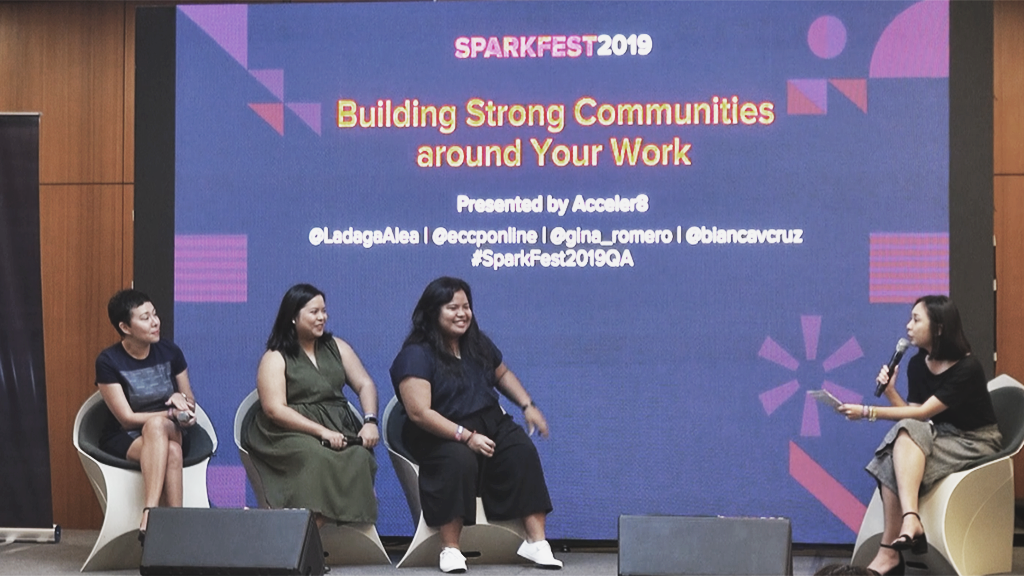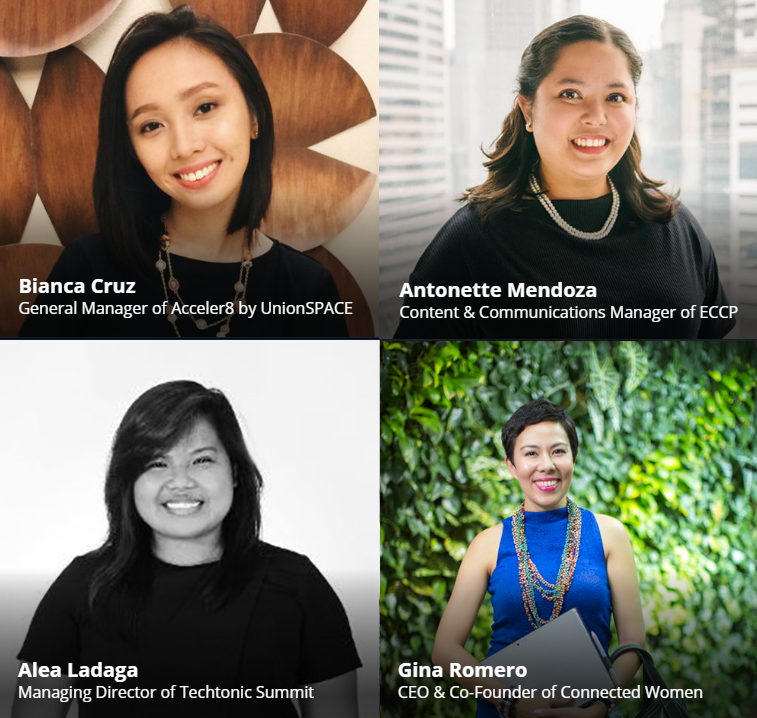This All Women Panel At #SparkFest2019 Just Shared Their Community Growth Secrets
 Contributed by
Nicai de Guzman
March 26, 2019
Contributed by
Nicai de Guzman
March 26, 2019

Spark Fest 2019 connected entrepreneurs and creative workers from different fields. The one-day, interactive conference also encouraged its attendees to network, find their passion, and build communities.
In the afternoon panel called “Building Strong Communities around Your Work presented by Acceler8,” three powerful women leaders shared their insights on how one can attract a market and make communities sustainable.
Taking part in the panel was Gina Romero, CEO and Co-Founder of Connected Women, a tech startup matching women entrepreneurs globally with Filipina women looking for remote work. At the same time, it is also a global community of #ConnectedWomen entrepreneurs, freelancers & professionals with a strong social media activity and regular meetups.
Another member of the panel was Antonette Mendoza, Content & Communications Manager of European Chamber of Commerce in the Philippines (ECCP) who helped build the youth committee after recognizing the sustainability problem of the ECCP.
The third panelist was Alea Ladaga, Managing Director of Techtonic Summit, who previously worked with QBO and other startups. Ladaga became passionate about the startup community after realizing how open it was to learning, failing, and teaching one another to grow.
Moderating the panel was Bianca Cruz, General Manager of Acceler8 by UnionSPACE, a hybrid instant office and coworking space designed for innovation and collaboration.

Attracting a target market
The first step in building a successful community is to find groups of people who are interested in your group or cause.
Romero addressed the question of whether you should target a small but niche community or a larger one. “When you restrict your community to a niche, you have to go out of your way to look for that person, retain them, and keep them engaged,” Romero said.
“If you go wide, you have to work harder at understanding more and different types of members in your community who will hopefully become your ideal customer eventually,” she added.
Ladaga shared her experience with QBO Innovation Hub. Their weekly QBO “Qlitan” started with just 10 attendees but it eventually grew. These meetups then became a chance for everyone to meet new people and catch up with old friends.
Ladaga also said that they initially banked on Facebook groups and the “pull” of influential people in their group. “After you stage the event, what happens next? How will you encourage them to be more involved?” she asked.
For Mendoza, the answer is making your value proposition very clear. She explained that it is similar to buying a product – when you encourage people to attend your event and join your groups, they should know what additional value it can provide them.
For their 200-strong network of young professionals, they do not only align their activities to fit the habits of their members, but they also strive to know their challenges. For some of these members, they cite one such challenge is networking with their older, more established peers.
“So we created an environment a safe space to start doing that. Eventually, we started a networking night that includes the chamber,” Mendoza said. She explained that they also have advocacy-related activities, such as adopting a community in Pulag, hosting climbs to bring up donations, and so on.
For their members, however, Mendoza cited that they can be very discerning. According to her, those invited to the youth committee of the ECCP should be employed or entrepreneurs themselves. To be formally invited, they have to show evidence, such as certificates of employment or business registration. “We want people who are really serious, who put in the time and effort,” Mendoza said.
Romero said that for Connected Women, most of their events were also community-led. After establishing online communities, the women in local areas started clamouring for meetups and events, she said.
Connected Women’s approach was to empower their members to organize these events themselves, which resulted in 147 events (#ConnectedWomen meetups) all over the Philippines, even in remote places such as Marawi. This was replicated by members from three cities in Pakistan, and hosts in UK, Taiwan, Malaysia and Singapore.
Sustainability of communities and events
Often, Romero is asked why they are spending so much time and resources on their events and activities. Her reminder for community leaders is to know their purpose. Is it to make money? To solve a problem? For example, the goal of their events is not to make money, but to attract the right kind of people in the community. Romero said that while they are a “product-centric community,” the communities are not there to sell a product.
Mendoza said that the youth committee of the ECCP is also not structured to be a money-making group. “The way our committee is structured is we are given seed money. It’s a very small amount for our first event which we have to pay back. And then they couldn’t give us money for anything else, anymore. We were on our own and that’s how we got really creative, by tapping partners such as Acceler8 and also other friends within the industry who would help us get our community together, friends of friends, bootstrapping. It forces us to get really creative,” she explained.
For Ladaga, it is important for them to first explain the nature of a startup. “How we structure events, it was more about awareness. Making the public more aware of startups – with how they work and how startups can help them and how startups need help from them,” she said. They have a basic program, a crash course on how to build a startup and innovate. They also have ‘Qlitan’ which highlight stories of entrepreneurs. It was a place where people can be real about their journeys.
The startup community in the Philippines is currently small, Ladaga explained. For them to get support – financially or otherwise – they need to bring the matter to the public stage.
Where do you start? And how to move up?
One of the biggest questions of the night was about how introverts or shy people can join communities.
Ladaga said that one should start with figuring out what they are most passionate about, before researching events or communities they can join. “If you don’t find it, start it. ‘Cause why not? Maybe you’re the one meant to build that community,” she said.
For Mendoza who came from a desk job, she explained that in her case, she was actively looking for a community where she can be engaged. Her advice: “Just go ahead and do it.”
“Join committees, join groups, find individuals, connect, have conversations. Work with as many different types of people so you can figure out your style – what do I like? What do I want?” Mendoza shared.
Mendoza elaborated, saying that it’s all about building your network, building your capabilities at the same time and giving back to the community that nurtured you. “If you find your people, stick to them and do amazing things,” she said.
These women also made a point that a lot of community builders, based on their experience, were actually women.
Ladaga said that women balance out the males in technology which is a male-dominated field. Women bring the heart into it, she said.
Mendoza shared that for the ECCP, there are only two women on the board but the youth committee has a completely different structure. “It’s mostly women. I honestly think that’s the future,” she said.
For Romero, she noted that Filipino women are willing to step up and lead. “We have it here,” she said when asked by one of the audience if it was more difficult to build her community in the Philippines compared to other countries.
Her advice to aspiring women leaders is to build confidence, start believing in themselves and join groups and communities. “We just have to step up, and don’t hold ourselves back.”
—
Our next global #ConnectedWomen #Meetup happens on April 10, 2019, signup here to attend a meetup near you!
Didn’t see a meetup near you? Sign up here to host or attend the next meetup in your area!










Sorry, the comment form is closed at this time.